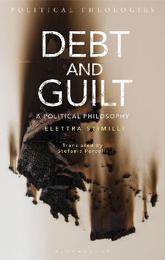
|
Debt and Guilt: A Political Philosophy
Hardback
Main Details
Description
The issue of debt and how it affects our lives is becoming more and more urgent. The "Austerity" model has been the prevalent European economic policies of recent years led by the "German model". Elettra Stimilli draws upon contemporary philosophy, psychology and theology to argue that austerity is built on the idea that we somehow deserve to be punished and need to experience guilt in order to take full account of our economic sins. Following thinkers such as Max Weber, Walter Benjamin and Michel Foucault, Debt and Guilt provides a startling examination of the relationship between contemporary politics and economics and how we structure our inner lives. The first English translation of Debito e Colpa, this book provokes new ways of thinking about how we experience both debt and guilt in contemporary society.
Author Biography
Elettra Stimilli is Assistant Professor in the Department of Philosophy at the Sapienza University of Rome, Italy. She is the author of Jacob Taubes (2004) and The Debt of the Living (2017) and the editor of Italian Critical Thought (2018). Stefania Porcelli is Associate Professor in Comparative Literature, CUNY, USA
ReviewsElettra Stimilli's new book offers a deeply-informed, succinct and far-ranging account of the debates around our contemporary condition of "universal indebtedness." By asking fundamental questions and putting major figures into dialogue, she has rebooted and redrawn a whole field of political thinking. Her book deserves to be widely read by those-both in and out of academia-who believe that the present regime of debt and guilt cannot have the last word. -- Richard Dienst, Associate Professor of English, Rutgers, The State University of New Jersey, USA and author of 'The Bonds of Debt' What a bracing, challenging, and compelling analysis and conceptual genealogy of the devastations of financial capitalism. Stimilli writes with clarity, eloquence, and brilliance. She not only shows how debt is the essential mechanism enabling the osmosis between the contemporary neoliberal state and the global financial market but also demonstrates the psychic, cultural and ultimately theological dimensions of debt in all its vicissitudes. This is essential reading for anyone who is trying to make sense of the current disaster. -- Rebecca Comay, Professor of Philosophy and Comparative Literature, University of Toronto, Canada
|